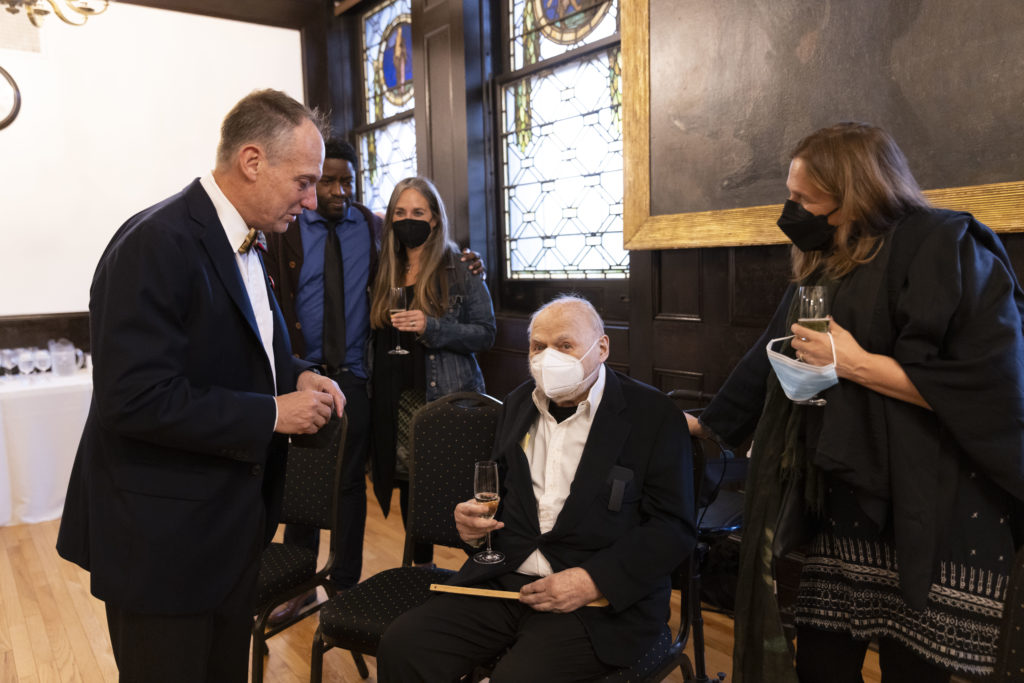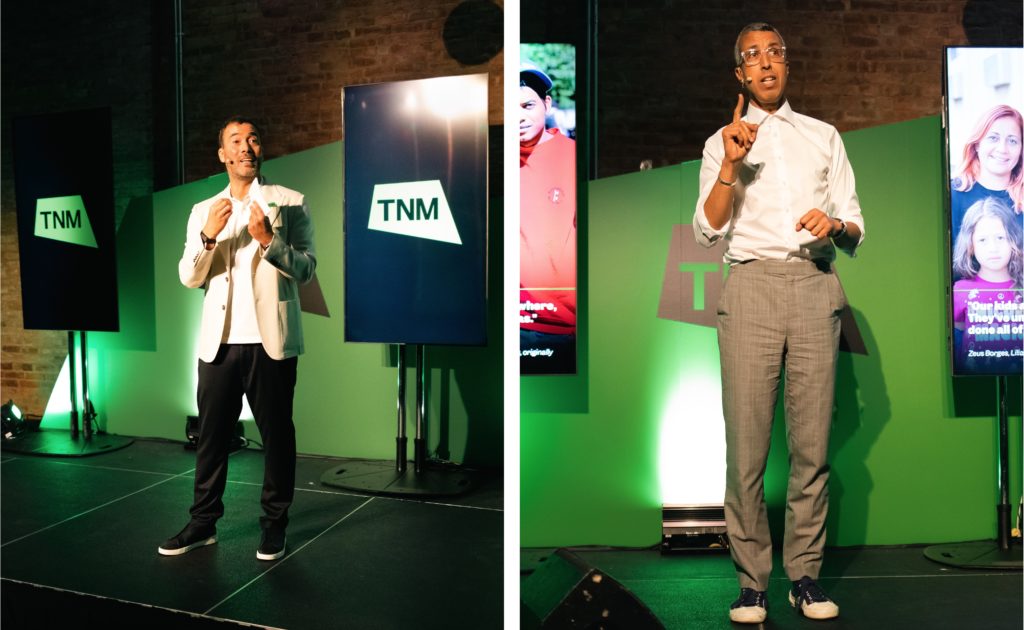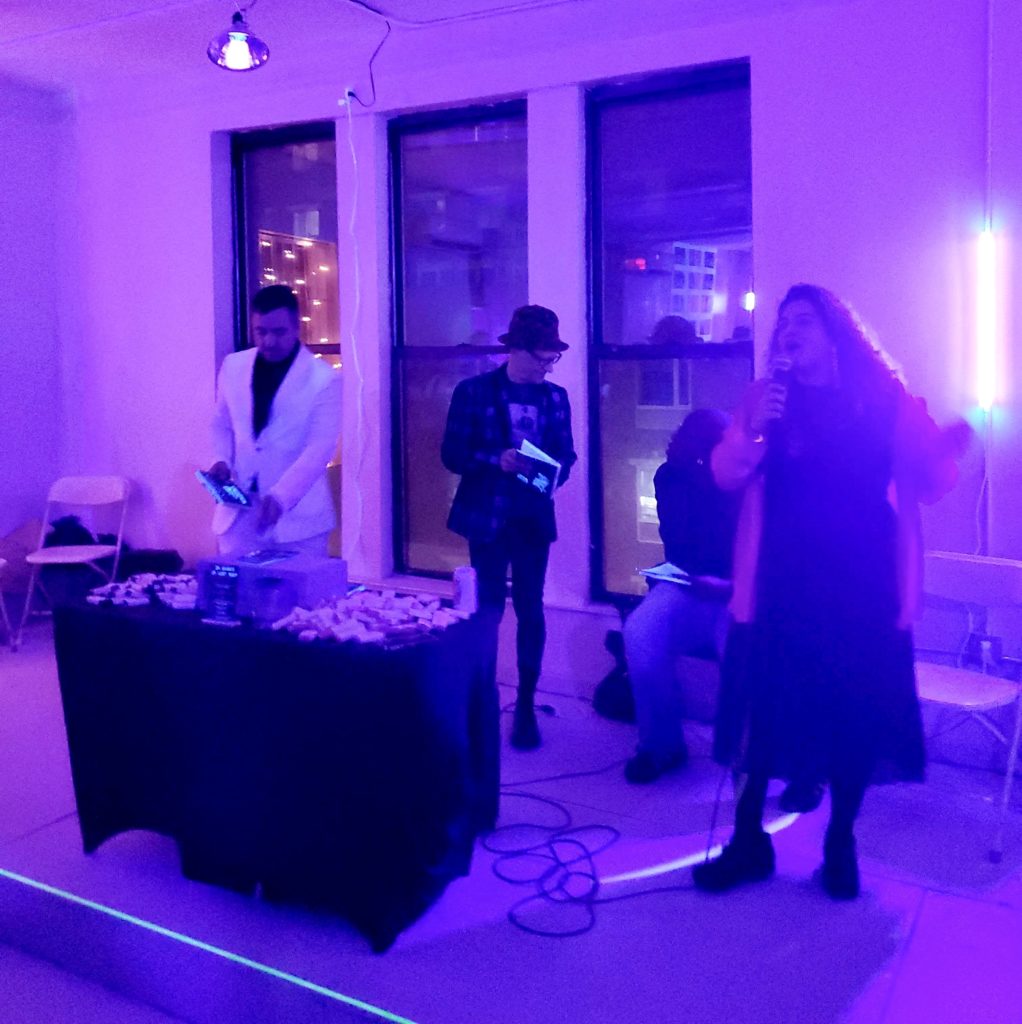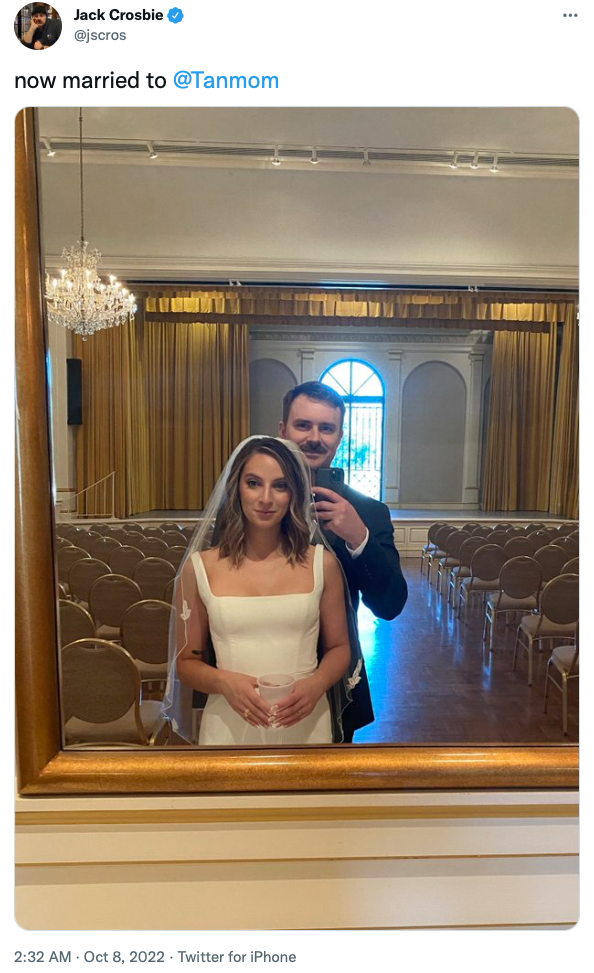Chaos and Raincoats
Making the scene this week: Victor Navasky, Jeet Heer, Chris Lehmann, Katrina vanden Heuvel, Richard Kim, Robert Boynton, D.D. Guttenplan, William Lewis, Kamal Ahmed, Matt Murray, Daisy Veerasingham, Jessica Coen, Nadja Spiegelman, Wayne Koestenbaum, Brontez Purnell, Julian Lucas, Jack Crosbie, Kara Mavros, and many more…

The News Movement co-founder William Lewis confers with Wall Street Journal editor-in-chief Matt Murray.
From recent college graduates to newspaper editors at the peak of their careers to magazine legends in their 90s, from America’s oldest continually published political magazine to a well-funded social media news experiment to the coolest new magazine of international literature, the stuff of life was certainly abundant across the vast swaths of the New York media community this week.
OUT AND ABOUT
On Wednesday evening, a very tall man with a chin curtain bordering on unruly handed The Nation’s national affairs correspondent Jeet Heer a business card identifying himself as an “Abraham Lincoln Reenactor.” Then he started belting out a Frank Sinatra number: “Holding hands at the movie show/ When all the lights are low/ May not be new/ But I like it. How about you?/ I like New York in June. How about you?” The song echoed around the New York Society for Ethical Culture’s Adler Hall, where The Nation was hosting a fundraiser for its internship program that doubled as a celebration of the 90th birthday of the program’s namesake, publisher emeritus Victor Navasky. “My birthday was actually July 5th,” Navasky later told The Fine Print, “so my celebrations are all over.”

Photo by Andrew Kelly
Despite the noise, Heer pressed on with a conversation with The Nation’s D.C. bureau chief and Chris Lehmann, former top editor of The New Republic and The Baffler. Both had come from out of town — Lehmann from D.C., Heer from Canada. “So do you go back later this week?” Lehmann asked. “There’s a little bit of a complicating factor,” Heer admitted, “which is I lost my passport.” Lehmann didn’t seem surprised. “This is how people become American,” he observed. Earlier, Heer had gone to the Canadian consulate, where he’d run into ambassador Bob Rae in the elevator. “He said he followed me on Twitter, nice to hear,” Heer said. “They told me the best thing to do is to fly to Buffalo and use my driver’s license to cross by land.”
The night’s centerpiece was a set of speeches about The Nation internship and Navasky. The funniest was by the magazine’s deadline poet Calvin Trillin. “When Victor started the intern program, I used to refer to it as the slave study program,” he said. Editorial director and publisher Katrina vanden Heuvel, whose daughter recently got engaged (“It was a hot secret for about six months,” she told The Fine Print), was not to be outdone. “There were some weddings, there were some affairs, and there’s some great friendships,” she said of the unexpected side effects of the internship program. “Now, in The Nation spirit, we don’t name names.” In his speech, The City editor-in-chief and former Nation executive editor Richard Kimmentioned the URL for his publication several times before unreeling a remarkable litany of former intern accomplishments. The final remarks were from Navasky himself. “I was promised that as a birthday present to me, I didn’t have to make a speech, so I’m not going to,” he told the crowd. “I’m speechless.”
The least funny speech was a pre-recorded video message from former U.K. Labour Party leader and former intern Ed Miliband, who didn’t mention the most widely circulated anecdote about his internship. The Nation’s late “Beat the Devil” columnist Alexander Cockburn claimed that he used to ask all the interns, “Is your hate pure?” “The feisty ones would respond excitedly, ‘Yes, my hate is pure,’” Cockburn wrote. “I put the question to Eddie Miliband. He gaped at me in shock like Gussie Fink-Nottle watching one of his newts vanish down the plug hole in his bath. ‘I … I … don’t hate anyone, Alex,’ he stammered. It’s all you need to know.” Robert Boynton, the director of the Literary Reportage program at NYU’s Arthur L. Carter Journalism Institute, interned the year before Miliband. He didn’t recall the columnist posing the question to him, though it didn’t seem out of character. “No one hated like Alex Cockburn,” he said. “[Christopher] Hitchens was a pussy compared to Cockburn.”
After the conclusion of the speeches, the Lincoln reenactor began singing “Happy Birthday” from his seat, and the crowd joined in before filing downstairs for a reception. As hors d’oeuvres circled the room, The Nation’s top editor D.D. Guttenplan told The Fine Print, “I was sent your picture today in case you were hovering as I was saying something politically unsound.” The internship was still unpaid when Guttenplan did it in the summer of 1979, so he drove a cab on weekends. “I was probably the only working class intern for five years, and I was an accident. Everybody else — you had to be able to live in New York. It’s true that in those days, I could make enough driving a cab three nights to live for the whole rest of the week, but New York — even then, you couldn’t live here for nothing,” he said. Yet, when he became editor, he initially opposed an intern group’s request for increased wages. “The Nation is always financially pressed. I was very glad when they made it the Navasky internship. I donated some money, because I thought paying the interns a minimum wage is a cause I’m down with. So I’m all in favor of paying the interns, but we don’t have any more money and these are tough times. I said to the interns, ‘We can raise your pay, but that means we have to cut one of your positions,’” he said. “In the end, it was a business decision and I felt we had to go with it, but I would still rather have one more person have this life-changing opportunity than pay them three bucks more an hour, and I’m not going to apologize for it.”

Current interns Finley Muratova, Karen Ng, Paige Oamek, Sam Russek, and Lucy Dean Stocktontook a break from their fact-checking responsibilities to hang out at the event. (“We all have second jobs,” noted Oamek.) Also present were Nobel Prize-winning economist Joseph Stiglitz, recently appointed Guardian U.S. top editor and former Nation executive editor Betsy Reed, Nation national affairs correspondent Joan Walsh, Harvard Law professor Randall Kennedy, Nation contributing editor Amy Wilentz, Columbia University historian Eric Foner, Al Jazeera Fault Lines executive producer Laila Al-Arian, Nation columnist Gary Younge, Nation deputy editor Christopher Shay (“I was not accepted as an intern. I applied when I was maybe 22 and didn’t get in, and it took me another ten years to crack The Nation.”), Nation literary editor David Marcus, Jacobin top editor Micah Uetricht, Jacobin staff writer Branko Marcetic, and Nation research director Samantha Schuyler, who last week moved to New York from Tallahassee, Florida and is staying with a friend while looking for housing. “So nice to meet you in person,” recent intern Zoya Qureshi greeted Schuyler. “I can’t believe it’s taken this long.”
Towards the end of the event, former Nation copy chief Judith Long approached vanden Heuvel saying, “I remember when you were an intern.” The publisher explained that though former interns learned much from Navasky, there are some of his habits even she doesn’t carry. “In Victor’s tradition, I have a vodka martini, dry, almost every night,” she said, “but I vow not to drink before six. Victor, I don’t follow in the two martini editor lunch.”

Also on Wednesday, London-based The News Movement celebrated the launch of its U.S. news service aiming to reach Gen Z, or “Generation Zed” in the British staff’s pronunciation, on the top floor of a building near Union Square. On exiting the elevator, guests were surprised with an old-timey newsroom set with actors playing a head-strong editor and his harangued reporters, who, in a bit of not uniformly welcomed interactive theater, eventually included the unsettled party attendees as the scene unfolded. After the brief performance, guests were led into a room with an open bar and a stage from which co-founder William Lewis, the former CEO of Dow Jones and publisher of The Wall Street Journal, and editor-in-chief Kamal Ahmed, former editorial director of the BBC News, explained how their “horizontal storytelling” is reimagining the news for a crowd that included Wall Street Journal editor-in-chief Matt Murray, Associated Press president and CEO Daisy Veerasingham, The News Movement’s executive editor for the U.S. Jessica Coen, former Barclays CEO Bob Diamond, and CEO of digital music distributor UnitedMasters Steve Stoute.

The News Movement’s co-founder William Lewis (left) and editor-in-chief Kamal Ahmed explain their approach to the news.
Before noon on Thursday, Astra editor-in-chief Nadja Spiegelman sent an email to people who had RSVP’d to the launch party for her magazine’s second issue — the “Filth” issue — taking place in Chinatown that night: “We tried our best to change the weather but we couldn’t. It’s going to thunder tonight, and we don’t have room for all of you inside. Bring your best raincoats and expect chaos.” On the night, despite the rain, a huge crowd turned out under the disco ball that, like the rain, is becoming a fixture of Astra parties. “I spent all week refreshing my weather app, trying to make it not rain tonight, and asking absolutely everybody I know to help me make it not rain tonight. I even googled, ‘How do you change the weather?’ Even Siri doesn’t know,” Spiegelman told the gathered crowd. “I really thought through collective magic, if I asked my entire staff and everybody I knew to focus on not having a rain storm, we could change the weather, and that’s, unfortunately, not how it works. But, on the other hand, there is a really, really powerful form of collective magic that does work and that is willing a fucking magazine into existence.”
A performance of contributor Wayne Koestenbaum’s short play In Search of Lost Soap, a highlight of the issue, was the night’s focal point. Koestenbaum played a soap vendor, presiding over a table of Astra branded soap (a bar of which this reporter was surprised to find in his pocket the next morning), poet Daniel Saldaña París played his assistant, Astra deputy editor Samuel Rutter played Marcello Mastroianni, wearing a white suit like Mastroianni on the beach in La Dolce Vita, and contributor Brontez Purnell portrayed Judy Garland. “They asked me for something for the Filth issue and I sent them a play that I had written. It’s not filthy, but it has soap in the title, so it seems apropos,” Koestenbaum told The Fine Print. “It seemed they would need something to clean up their act.”

How did Purnell prepare to play Garland? “I’ve known about Judy all my life. My favorite thing to relisten to is those weird tapes she made when she was in England — she was in some castle in England right before she died. On YouTube, the funniest one is ‘Judy Garland dies in Plane Crash.’ She just talks about how she would feel. She’d be like, ‘I hate riding on planes. Of course, I would get top billing. For everybody else, turn to section B,’” he said. “She’d always been a theater kid. She grew up in Grand Rapids, her dad was a gay guy that ran a theater. Her dad and her son are gay, and she’s a fucking faggot, so who else to play her but I? I also don’t believe she was 44 when she died. I believe that she was a tiny bit over, which I think it’s awesome to lie about your age.”
In attendance were Spiegelman’s parents, graphic novelist Art Spiegelman and New Yorker art director Françoise Mouly (“This is not their dream event,” said the editor-in-chief), Astra managing editor Medaya Ocher (“My baby slept through the night. She’s five months, that made me very happy.”), Our Dark Academia author and softball veteran Adrienne Raphel, Brother Alive novelist and Drift fiction editor Zain Khalid (who had to dip out early to read at Franklin Park in Brooklyn), Baffler web editor Zach Webb, Astra contributor Gabriel Matesanz (who flashed three library cards), librarian Athena Botbol, Publishers Weekly news editor John Maher, The Millions editor Sophia Stewart, Bangkok Wakes to Rain novelist Pitchaya Sudbanthad, New York Review of Books publicist Nicholas During, Gertrude Stein biographer Francesca Wade, New York Times Books contributing essayist Jennifer Wilson, n+1contributor Aaron Timms, n+1 web editor Lisa Borst, poet Kyle Carrero Lopez, New Yorker staff writer Julian Lucas (“I’m doing a profile, which I won’t say anything about, but I was at a party that the subject threw and he was like, ‘How does it feel being a reporter? You’re like a dentist, everybody needs you and everybody’s afraid of you.’”), McSweeney’s visiting editor James Yeh, Paris Review web editor Sophie Haigney (who was very excited to hand out her new business cards), FSG editor Jackson Howard, newly appointed Interview Magazine digital editor Jake Nevins, Drift co-editors Rebecca Panovka and Kiara Barrow, Plunder author Menachem Kaiser (“So many people here have slept with each other. I don’t even know, but I sort of know. All of my friends here have exes here.”), Acts of Desperation novelist Megan Nolan, Forever magazine co-founder Anika Levy, English political scion Peter Huhne (wearing striped boxers), Harper’s associate editor Elena Saavedra Buckley, Harper’s assistant editor Lake Micah(“There’s nothing here but soap. I’ll wash my mouth out.”), New Yorker head of research Fergus McIntosh, a lively Italian contingent, and Either/Or novelist and Astra contributor Elif Batuman. “I got to interview Annie Ernaux for an event at Lincoln Center,” Batuman told The Fine Print. “She has a very radiant smile.”
LOVE NOTES
On Friday, October 7, Rolling Stone correspondent Jack Crosbie married Kara Mavros, an executive communications manager at the architecture firm Gensler, at the Museum of Fine Arts in St. Petersburg, Florida. When Crosbie, who reported from Ukraine as the war began, told The Fine Print about their engagement in the first edition of this column in March, he said, “I feel like doing the logistics on this is going to be a lot more fun than Ukraine was.” After the wedding, he shared a statement: “It was a perfect celebration attended by many of New York City’s media elite (people who have been laid off by multiple digital media publications) and also Neel Patel.”

UPCOMING
Tuesday
➾ 6:30 p.m. Former Washington Post media columnist and New York Times public editor Margaret Sullivan will be launching her new book Newsroom Confidential with a conversation with Atlantic newsletter writer and host of the Fast Politics podcast Molly Jong-Fast at Cooper Union’s Great Hall.
➾ 7:30 p.m. Former New York Times columnist Anand Giridharadas will discuss his new book The Persuaders with Times correspondent Jodi Kantor at The Bell House in Gowanus.
Thursday
➾ 7:30 p.m. Nick Drnaso will discuss his new graphic novel Acting Class with Vulture books editor Maris Kreizman at the Greenlight Bookstore in Fort Greene.
Have a moment? Let us know!
